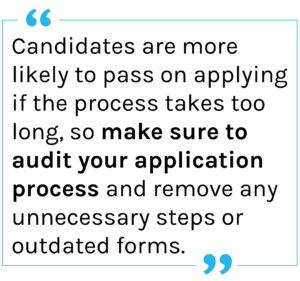Timing can make or break your applicant process.

The application process is a tough aspect of hiring to perfect. There are a number of things that can discourage job-seekers from finishing an application, impact their impression of your institution as an employer, or affect their final decision about an offer. Timing is one of those factors—the timing of your posting, the timing of your communications, and the timing of your candidate journey all impact the applicant process.
So how can you make sure your timing is right?
Communication matters
For a candidate in the application process, communication can make or break their experience. Communicating frequently and promptly can leave candidates with a positive impression of your organization – even if they don’t receive a job offer.
Job seekers often submit multiple applications. They want to know that their application has been received and where they are in the application process, so they can make informed decisions about other positions they’ve applied for.
Top candidates are gone from the market within ten days, so keeping them engaged is vital. It’s easy to set up automated emails through your ATS to make sure that every applicant receives a confirmation, and you can even embrace AI to schedule interviews and phone screens with candidates quickly and easily.
Almost 40% of candidates never receive a response when a company rejects their application, so even sending rejections to candidates who aren’t moving forward can help you stand out from the crowd and leave a good impression.
 Speed matters
Speed matters
Timing makes a difference throughout every step of the candidate journey, starting with the speed and ease of the actual application process.
Candidates are more likely to pass on applying if the process takes too long, so make sure to audit your application process and remove any unnecessary steps or outdated forms. A streamlined process goes a long way towards making sure the best candidates apply to your postings.
After the application is complete, speed is equally important. If your time-to-fill is too long, you’re going to miss out on some of the best candidates who either accept other offers, become frustrated with a slow-moving process, or decide that you’re uninterested in their application. The average time-to-hire is 43 days, but many companies now make job offers within a week. Where does your institution fall? Can you compete with a week-long process? What about with a 43-day turnaround? Take a look at your data and if your candidate journey is too slow, look for areas where you can speed things up—by using automation, upgrading your tech, and communicating frequently and clearly.
Final thoughts
Ensuring that candidates move efficiently through a streamlined and modern application process can help you hire better, and make sure that good candidates keep coming back to your institution. Don’t forget to communicate often to keep your candidates engaged and take advantage of automation to save time and money for your HR team.